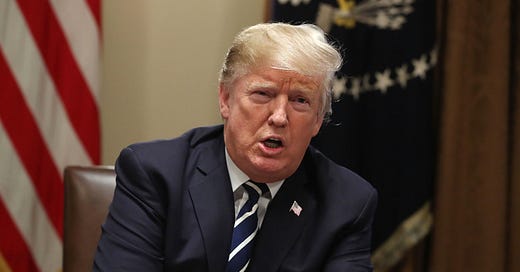Courts Swat Down Trump’s Executive Immunity Defense
Judge Chutkan: The presidency “does not confer a lifelong ‘get-out-of-jail-free’ pass.”
ON FRIDAY, THE U.S. COURT OF APPEALS for the D.C. Circuit unanimously rejected Donald Trump’s claim that he is absolutely immune from any lawsuits relating to the 2020 election-stealing efforts and the January 6, 2021 insurrection. The ruling came down in three consolidated civil cases brought by a handful of Democrats in Congress and Capitol police officers who were at the U.S. Capitol that day. By coincidence, U.S. District Judge Tanya Chutkan also ruled on Friday that Trump has no blanket immunity from prosecution in the January 6th criminal case against him, either. That case goes to trial on March 4, 2024—one day before Trump is presumptively crowned the Republican nominee for president on Super Tuesday. In all likelihood, the Washington, D.C., jury will convict. Which means the GOP’s nominee for president will have a federal felony conviction to his name and a sentencing date on the calendar going into the general election.
The key question for presidential immunity has to do with protecting the office of the presidency itself. As explained by the D.C. Circuit, its purpose is “to assure that [a president] can fearlessly and impartially discharge the singularly weighty duties of the office.” What Trump did on January 6th was campaign for re-election—not act as a president. Although the D.C. Circuit left the door open for Trump to gin up evidence to show that his Stop the Steal rally, violence-inspiring tweets, and refusal to stop the surge on the Capitol were all taken in the scope of his duties under Article II of the Constitution, it’s hard not to read that invitation as tongue-in-cheek. No “facts” are going to change what we already know about the Big Lie. Trump went to the extraordinary lengths he did to stay in power at all costs—not exercise the fleeting power he had in the moment.
Bear in mind that the Supreme Court has had precious little to say about presidential immunity, which is a judge-made concept that exists nowhere in the actual text of the Constitution. The Court’s most recent case stretches back to 1997. In Clinton v. Jones, it rejected President Bill Clinton’s bid to get rid of a sexual-harassment claim from Paula Jones, an Arkansas state employee, on immunity grounds, holding that a president’s immunity from lawsuits for official acts does not extend to unofficial ones, including actions Clinton took as state governor. The only other existing Supreme Court case is Nixon v. Fitzgerald (1982), in which former President Richard M. Nixon, long out of office, secured immunity in a civil case brought by a plaintiff whose job at the Department of the Air Force had been eliminated in 1970 (while Nixon was still president) after he gave unflattering congressional testimony about his superiors.
In hindsight, the Clinton v. Jones decision may have been shortsighted. The Paula Jones lawsuit led to the Monica Lewinsky scandal, which roiled the country once it was thrust within the scope of Independent Counsel Kenneth W. Starr’s multifaceted investigation into the Clintons.1 Bill Clinton had denied having sexual relations with Lewinsky in his civil deposition in the Jones case but later told a federal grand jury that he didn’t lie in the deposition. Clinton was ultimately impeached for lying under oath to the grand jury while he was president, but the Senate declined to convict. (His Arkansas law license was later suspended and he was slapped with multiple fines.) With Clinton’s approval ratings at nearly 70 percent at the time, the fact that he was impeached for a sex scandal rather than for official conduct in office may have contributed to Senate Republicans’ failure to convict—and the delegitimizing of the impeachment process in general, to the benefit of a future President Trump. In any event, if the point of immunity is to keep presidents focused on the job, a temporary stay of the Jones case could have avoided a lot of damage to the country—and the presidency.
In urging absolute legal immunity now, Trump is in a posture entirely different from Clinton’s. Rather than trying to temporarily stall a civil lawsuit for money damages relating to pre-presidential conduct, Trump is trying to dodge his role in throwing the country into a constitutional crisis now that he is a private citizen. His lawyers tried to substantially expand the official-vs.-unofficial conduct test to cover anything a president does that’s of “public concern.” In a nutshell, Trump argued in the civil case that by publicly talking about the Big Lie while president, he was discussing a matter of public concern: Whether the election was fraudulent, and who would ultimately win the White House. Because his speech was of public concern, his words and any related actions must be totally insulated from legal liability—otherwise, presidents would be subjected to loads of baseless legal challenges that could interfere with their ability to fulfill the duties of the office.
In the criminal case, with different lawyers in charge, his argument was slightly different: He claimed to have “absolute immunity from criminal prosecution for actions performed within the ‘outer perimeter’ of his official responsibility” while he was president—unless he was actually convicted on the second impeachment charges. Only in that instance, by Trump’s bizarre logic, could he be prosecuted for the same wrongdoing. Chutkan blew his argument out of the water:
The Constitution’s text, structure, and history do not support that contention. No court—or any other branch of government—has ever accepted it. And this court will not so hold. Whatever immunities a sitting President may enjoy, the United States has only one Chief Executive at a time, and that position does not confer a lifelong “get-out-of-jail-free” pass. Former Presidents enjoy no special conditions on their federal criminal liability. Defendant may be subject to federal investigation, indictment, prosecution, conviction, and punishment for any criminal acts undertaken while in office.
The three-judge panel of the D.C. Circuit saw through the unworkability of Trump’s ‘anything goes while president’ standard for immunity, as well. And it did so with an impressive level of nuance and precision, no doubt anticipating that the case could go to the Supreme Court, which will be looking to the implications of its ruling on the presidency more generally. Chief Judge Sri Srinivasan wrote of Trump’s capacious conception of immunity: “That is a sweeping proposition, and one that ultimately sweeps too far. The notion that speech must relate to a matter of public concern does not rule out much when the speaker is the President.” The president, in other words, is not a king.
Under the Supreme Court’s official-vs.-unofficial acts test, which was solidified in Clinton v. Jones, the civil claim of immunity was an easy one to resolve. Here’s Srinivasan:
When a first-term President opts to seek a second term, his campaign to win re-election is not an official presidential act. The Office of the Presidency as an institution is agnostic about who will occupy it next. And campaigning to gain that office is not an official act of the office.
Srinivasan underscored that Trump himself tried to personally intervene in Texas v. Pennsylvania (one of the 62 lawsuits aimed at challenging the election) by arguing to the Supreme Court in that he was acting in “in his personal capacity as candidate for re-election to the office of President,” and not in his official capacity as a sitting president. Normally, only the actual parties—plaintiffs and defendants—can participate in the primary disputes in a lawsuit. Intervenor-parties must have an especially good reason to get a seat at the table. Trump argued that it was his “unique and substantial personal interests as a candidate for re-election to the Office of President” that justified his intervention in the Texas case. (He lost.)
Chutkan addressed the unofficial-vs.-official distinction too, noting to begin with that—unlike in Clinton v. Jones—no potential “burdens would result from the criminal prosecution of a former President” because Trump “is no longer performing official duties.” As for creating a chilling effect on future presidents who might feel burdened by the prospect of a post-presidency prosecution if the January 6th indictment moves forward against Trump, Chutkan harkened back to Watergate: “President Nixon argued that if recordings of his conversations were subject to criminal subpoena, the Presidential decision-making process would be compromised because his staff would be less candid.” The Supreme Court disagreed.
Criminal conduct, in short, is not part of the duties of the office.
On its face, Trump’s claim that his actions on January 6th were totally immunized because he was president (when he was actually flouting the duties of the office in seeking to overturn the election results in every way possible) seems too ridiculous to even bother with. But as Chutkan wrote, “If the specter of subsequent prosecution encourages a sitting President to reconsider before deciding to act with criminal intent, that is a benefit, not a defect.” Although Trump has, once again, pushed the Constitution beyond its ostensible limits, where no president dared go before, shoring up its boundaries could one day prove to be a good thing.
Full disclosure: I served as an associate independent counsel under Starr before his office picked up the Lewinsky investigation.






